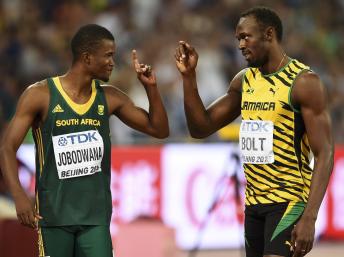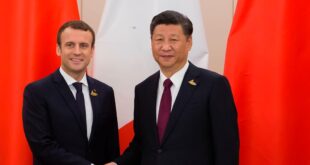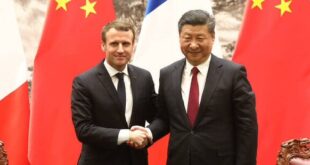South African runner Anaso Jobodwana is aiming high after winning third place in the 200 metres, he said after the race. His under-20-seconds time puts him in the running elite and he plans to stay there, he told RFI, while paying tribute to compatriot Wayde Van Niekerk.
Poultry famously featured heavily in the diet of a certain Usain St Leo Bolt seven years ago in Beijing.
The then 22-year-old Jamaican extolled the joys of chicken nuggets at mealtimes during the day before he went out in the evening and stormed to the Olympic 100 metres title.
Athletics World Championships 2015 – Click here for more articles
Chicken was to the fore in the prelude to Anaso Jobodwana’s record-breaking run in the men’s 200 metres on Thursday night in the Bird’s Nest stadium.
He had chicken and eggs at breakfast time and chicken and broccoli at lunch. The musical menu included J Cole, Kendrick Lamar and Dr Dre. With that nutritional and musical mix he said he was ready to run.
Well, he got all the beats right.
The South African took the bronze medal in a national record of 19.87 seconds. Ahead of him were Bolt and Justin Gatlin in 19.55 and 19.74 respectively.
It was Jobodwana’s third consecutive 200 metres final in a major championships. He was in the 2012 Olympics final and the 2013 Moscow world championships where he finished sixth.
At the start of the 2015 meeting in Beijing, South Africa had never won a medal in a men’s or women’s flat sprint event at the world championships. But following Wayde van Niekerk’s 400 metres gold on Wednesday and Jobodwana’s success, the country is finally on the sprinting map. There’s still some way to go, though, before it’s in the same league as the United States or Jamaica.
“The national record is not going to stay for long,” said Jobodwana after his final. “Because Wayde and I are going to fight for it. We’ve already joked that we’re going to fight for it until we retire. To break the national record in a championship final after two earlier races, it’s a huge bonus on top of the medal, I’m really happy. It shows that I’m now in the elite bracket of runners. I feel good.”
His bronze was a close-run thing. The difference between him and fourth-placed Alonso Edward was two thousandths of a second, their exact times being 19.861 and 19.863 respectively.
For the 25-year-old Panamanian, who took the silver medal in Berlin in 2009 at the age of 19, 19.87 is the third-fastest result of his career.
While Jobodwana was breaking national records in the race, Bolt was writing a different kind of history.
The 29-year-old became the first man to win four consecutive world championship 200 metres titles. His victory also allowed him the boast of first man to defend the 100 and 200 metres at a world championship. It was also his 10th gold medal at the championships since 2009.
Jobodwana isn’t yet in that stratosphere. But then again, that’s no shame. Bolt inhabits a land unto himself.
Back here where the mortals roam, Jobodwana said once he’d recovered from the race he’d spend his time responding to the messages of support that he’d received on various social networks.
“I was receiving all the messages but because I was in competition mode, I didn’t want to write anything but now I’ll start responding,” he said. “The support for me has been huge. There was lots of support and I’ve appreciated all the kind words that have been said. It’s huge and irreplaceable.”
Jobodwana said his next goal would be to maintain the consistency that has taken him to consecutive major finals and to keep running below the 20 second threshold.
“I’m glad I ran under 20 seconds in the final because I feel like I’m an elite runner now,” he said. “Before that when I was running 20 plus, I felt like I was still average and now I feel like I belong on that podium.”
The results show the 23-year-old to be progressing. In the Olympic final three years ago, he finished in 20.27 seconds. At the Moscow world championships, the time was 20.13.
There may well be even faster times ahead for the lad from the Phakamisa township. But the stars aligned for him thousands of miles away from home.
Jobodwana said the British former decathlete Daley Thompson urged him to look back at some old races in the 200 metres. And before the final Jobodwana followed up the tip. He saw a run from 1993 involving the Namibian sprinter Frankie Fredericks.
“I saw what Fredericks was doing when he came from behind,” he explains. “So, when I came out of the back stretch and I was behind, I kept that image with me. I kept on pushing to the line.”
While an African of old helped in a moment of crisis, a contemporary also contributed to the bronze.
“Wayde’s victory was a huge inspiration,” added Jobodwana. “I said to my coach after Wayde’s gold medal that Wayde had just shown me that I couldn’t leave the track without a medal. That was significant. I went into the race with my own expectations and Wayde’s image in mind. He was a huge inspiration.”
 موقع وجه أفريقيا موقع وجه أفريقيا هو موقع مهتم بمتابعة التطورات في القارة الأفريقية
موقع وجه أفريقيا موقع وجه أفريقيا هو موقع مهتم بمتابعة التطورات في القارة الأفريقية



